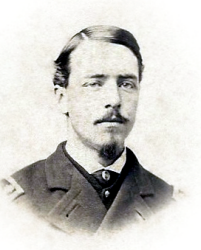Monday, October 21.—We again started this morning for Fortress Monroe, and as we proceeded had a calmer sea. When I got up this morning, I had my first taste of seasickness, owing to the closeness of my state-room. My chum refuses to have the window open, and the consequence is we have more foul air in the room than is pleasant for me. I was soon well, however, after getting on deck, although I carefully and secretly looked over the railing into the sea, and gave Davy Jones a scanty offering. It was amusing to see the soldiers sick and vomiting, especially after I was well. We arrived at the fort about 10 a.m., and anchored near the Atlantic. As nothing particularly interesting happened while we were here, I shall just jot down a few events interesting to myself only. I went ashore and walked all over the fortress, and all around the walls. There is a ditch all around the fort, and on some sides a water battery on the outside of it. There is one tier of guns in casemates, and one en barbette. On the sea side, outside of the walls, is the Floyd gun mounted, and the Union gun ready to mount, both of them remarkable only on account of their size. The fort is connected with the mainland by two sandy necks of land, between which is a large body of water which has access to the ocean by a channel running through one of these necks, and over which a new bridge has lately been built. This last-named neck is the one by which they go to Hampton and the mainland. The interior of the fort is quite pretty, trees growing there, and walks being laid out very much like a park. There are several houses here, and also a church. A man might make himself very comfortable here, in my opinion.
I walked over to the place where most of our troops are encamped, which lies between Hampton and the fort, and which is approached by the neck before referred to. I went to the camp of the 16th Massachusetts, and saw Waldo Merriam, the adjutant, and Bill Amory of Jamaica Plain. I had a very pleasant time, and was delighted to see old faces again. I saw a very good dress-parade, and returned to the fort again, passing through the camp of the Naval Brigade, Colonel Wardrop. I spent the night at the Hygeia Hotel, most of which is used as a hospital for our troops. Just as I had gone to sleep I was waked up by the most fearful succession of screams I ever heard in my life. It turned out to be a sick soldier in the hospital who was having his wounds dressed. The next morning I met Harry Fisher, captain’s clerk on board the Minnesota, and went with him on board of her. I was well paid, too, for a more beautiful and clean-looking ship I never saw. The decks looked clean enough to eat one’s meal off of, and the long line of guns on each side, all polished and in perfect order, seemed eager to bestow a few compliments on any rebel or enemy who might make his appearance. Hubbell went with me, and was also much pleased with the ship. I saw Captain Van Brunt[1] on board, looking as well as ever.
We waited here at Hampton Roads for a week, anxiously expecting orders to sail, and growing at times despondent and gloomy about the success of the expedition. Then, to make us still more gloomy, reports were flying about of the desertion of the commodore’s private secretary, with important papers, containing the secret naval signals, our place of destination, etc. To crown the whole, and plunge us still deeper into despair, we heard of the battle of Ball’s Bluff, and of the defeat of our forces. The news of Putnam’s death, of Holmes[2] being wounded, etc., made me feel the reality of the war, which is a hard thing to bring home to one’s self until one loses a friend, or meets with some such mishap. However, as the ships began to get up steam, and as various other little matters showed that we were going to start soon, our fears and despondent feelings began to give way to a more cheerful state of mind, and when we were actually under way every one felt buoyant and hopeful. While waiting here, one of the 7th Connecticut soldiers was drowned by jumping overboard for a plate which we had dropped. Major Pangborn, formerly editor of the Boston Bee, came on board. He is paymaster for our brigade.
